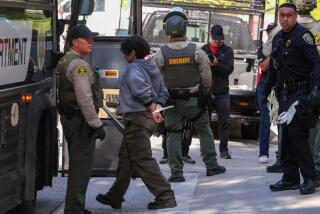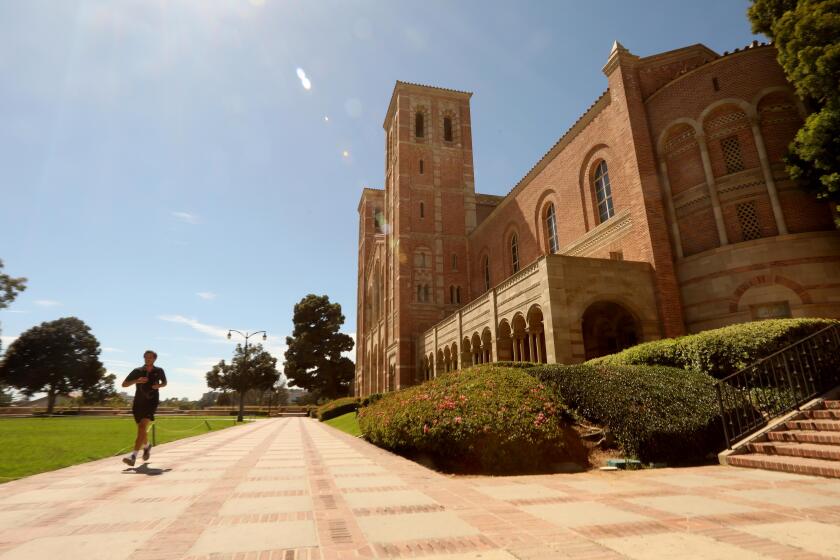Riot Victims Who Sue Police Face Tough Task : Unrest: Cases charging failure to protect are hard to win because of immunity laws. One man has had a difficult time finding an attorney to handle his case.
Sometimes, Fidel Lopez says, his head aches so badly that he cannot sleep. The hearing is gone in his left ear. He finds it hard to swallow.
In the frenzied early hours of the Los Angeles riots, Lopez was among the first victims of mob cruelty, dragged out of his truck and beaten senseless at Florence and Normandie avenues.
Unable to go back full time to his contracting work, Lopez is angry that Los Angeles police left him defenseless at that corner, where the beatings of several motorists, including trucker Reginald O. Denny, were televised and broadcast around the world.
âWe live in a civilized country,â Lopez said. âThere was no reason to leave all these people with no protection.â He remembers passing a patrol car a block away from the fateful intersection. âWhy didnât they say nothingâ to warn him, he asked.
Lopez wants to sue the city of Los Angeles, citing failure of its police, to force the city to pay for his medical treatment and compensate him for lost wages. At least one lawsuit has been filed against the city in U.S. District Court, by a radio reporter injured while covering the riots.
But three attorneys have turned down Lopezâs case, he said. And many legal experts say such lawsuits are difficult--if not impossible--to win because governmental immunity is a common feature in most state codes, including Californiaâs. Recent U.S. Supreme Court decisions make federal claims difficult as well.
The California Government Code says that no state or local government, nor its employees, are liable for the failure âto provide sufficient police protection.â A similar code section protects municipal fire departments.
âI donât see any chinks in the armor that the city has in terms of its immunity,â said Gerald Uelmen, dean of the University of Santa Clara School of Law.
There is more recourse in federal courts, experts say, but not much more. A 1989 U.S. Supreme Court opinion written by Chief Justice William H. Rehnquist said individuals have no constitutional right to protection.
âThe due process clause imposes no duty on the state to provide members of the public with adequate protective services,â Rehnquist said, ruling in a Wisconsin case to determine whether officials were responsible for permanent brain damage a child suffered when they failed to remove him from his fatherâs home despite repeated reports of abuse.
In light of that decision, Prof. Erwin Chemerinsky of USC Law Center said: âYouâre not going to be able to sue the government, because the government has no duty to provide protection.â
In May, wire service reporter Bob Brill sued the city and the Los Angeles Police Department under federal civil rights laws, seeking $20 million for injuries he suffered when he was beaten at the intersection where Lopez was attacked.
Brill was âhit in the head, sustained a concussion and a broken eardrum and was kicked and stomped and sustained a broken thumb,â according to his lawsuit. âInstead of protecting Brill, or anyone else for that matter, the cowardly police fled the insurrection scene,â the lawsuit contends.
But experts say federal civil rights statutes require claimants to prove that police failure to respond stemmed from a policy of racial discrimination or of calculated indifference toward a particular area.
Still, attorneys do not rule out the possibility of lawsuits. A number of riot victims have approached the ACLU Foundation of Southern California, said Robin Toma, staff counsel.
âIt would be a mistake to say the city is invulnerable, when there is so much evidence reported of not just failing to act, but of acting in ways that would make less effective their response,â Toma said.
Toma cited the absence of former Chief Daryl F. Gates, who was attending a political fund-raiser in the riotsâ early hours; a departmental retreat in Oxnard that was attended by two-thirds of the departmentâs 18 patrol captains on the first day of the riots, and the cityâs questionable emergency response plan.
Toma added: âGiven the fact that a violent response (to the verdicts) was not unexpected, I think there is evidence to suggest more than negligence, that could suggest deliberate indifference.â
According to UCLA law professor Gary Schwartz, states are divided on the issue of how far governmental immunity extends.
âIn most states, you cannot recover for the lack of law enforcement as such,â Schwartz said, âbut in some states you can recover if (for example) you call 911, and the police say âweâre comingâ and they donât come.â
California adopted its immunity provisions in 1963--two years before the Watts riots spawned claims from people seeking compensation for their losses.
A 1961 state Supreme Court decision led the Legislature to clarify state codes granting governmental immunity. During that process, the Legislature repealed a code section that had made local governments responsible for damages caused by mobs or riots.
After the 1965 unrest, at least 25 lawsuits were filed in Los Angeles Superior Court by merchants whose properties were destroyed or by insurance companies who had reimbursed clients for their losses.
The suits contended that police, the California Highway Patrol and the National Guard were responsible for losses suffered through the looting and arson because they had failed to either disperse crowds before the rioting or respond quickly during the six--day disturbance.
According to city officials, no suits were successful.
A key decision affecting those suits was a 1969 state Court of Appeal ruling dismissing the claim of Israel and Ethel Susman, who owned a Main Street clothing store that was ruined by looters and arsonists.
âThe general immunity afforded to the city by . . . the Government Code precludes recovery of damages by the plaintiffs resulting from the inadequacy of police protection service,â the appeals court said in its decision.
The same result would occur today if similar lawsuits were filed, said Thomas Hokinson, senior assistant city attorney in charge of the civil liability division. âIf theyâre alleging the officers failed to do this or failed to do that, thereâs no liabilityâ unless an officer specifically promised protection and did not provide any, Hokinson said.
But others contend that the city might be vulnerable for failing to warn citizens or to set up some mechanism to keep them out of the riotersâ path, particularly if officers were on the scene and left.
âThereâs a small opening for people having suffered injuries resulting from a dangerous condition sustained on city property,â said Southwestern University School of Law professor Alan Calnan.
âYou could make an argument the rioting occurrence at that intersection was a dangerous condition. If the police were aware of the dangerous condition and failed to take any reasonable action to alleviate the problem, they might be held liable. The failure to put up roadblocks . . . might be conduct that would be unreasonable.â
In federal cases, some believe that a city could be liable for damages if plaintiffs show they received less protection because of discrimination. âWhat if it were demonstrated that there was a policy . . . that the police were just going to pull out of the black area, (that) they werenât going to enforce the laws?â asked James Kushner, professor at Southwestern University School of Law.
If it could be proven âthere was a racial consideration as part of the decision not to enforce the law, a city can be liable for violation of civil rights by police,â he said.
The Supreme Court has also ruled that a municipality can be held responsible for damages if its officials fail to act out of a deliberate indifference to constitutional rights.
According to constitutional law professor Michael Gerhardt at the College of William and Mary, a city or official agency would have to âhave a policy or custom of inaction or conduct that rises to the level of gross negligence.â
When police left the scene near Florence at Normandie avenues, he said, âpresumably they did that according to orders. . . . The question becomes was that pursuant to a policy or was that policy grossly negligently conceived or executed.â
To Lopez, the legal complexities boil down to a one-sentence summation of what three lawyers have already told him: âThey say I canât fight with the city.â
More to Read
Sign up for Essential California
The most important California stories and recommendations in your inbox every morning.
You may occasionally receive promotional content from the Los Angeles Times.










